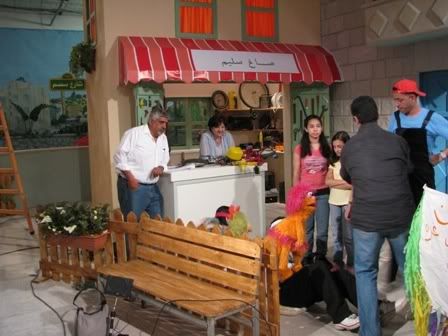Oct
30
2009
By Daoud Kuttab
The decree issued by Mahmoud Abbass, the president of the Palestinian Authority, has pushed the conflict between PLO’s main faction, Fateh, and the Islamic Hamas movement to yet another stage. While many consider this move very risky for the future of Palestine, others feel that it is the only democratic way out of the impasse.
It has been known for a long time that October 25 was the constitutional deadline for the current Palestinian Authority’s legitimacy as an elected body. The Palestinian Basic Law, a sort of interim constitution, clearly calls for simultaneous presidential and parliamentary elections. The unexpected death of Yasser Arafat and the untimely presidential elections 60 days after that, as per the Basic Law, created a problem in that in order to hold presidential and parliamentary elections at the same time, one of two things was needed. Either the parliamentary elections would be held before the end of the regular term or the presidential elections would be delayed.
Continue Reading »
Oct
16
2009
By Daoud Kuttab

It was 9:47 on Tuesday October 12th, 2009 when studio director Saed Andoni made the oft repeated word in film and television. Action. The action he was calling for was the filming of a short scene of a limbo set representing the bedroom of the Palestinian muppet character, Karim.
The filming of this small scene marked the launch of the filming of the fourth season of the Palestinian version of Sesame Street. The filming is new on many fronts. It represents the maiden filming by new Palestinian media NGO, PenMedia which I established shortly after resigning from my previous position as the director of the Institute of Modern Media at Al Quds University. PenMedia a subsidery of my Amman-based Community Media Network has a local advisory board headed by former Palestinian head writer Khalil Abu Arafeh. Continue Reading »
Oct
15
2009
By Daoud Kuttab
The social and economic life in Jerusalem and the West Bank appears to be on a positive upwards trend. Salam Fayyad’s government has been successful (with the help of donors) in providing economic growth; people are working, shops are stocked restaurants and cafés are full of paying customers.
An improved security situation has meant that towns like Nablus, Jenin, Bethlehem and Ramallah are enjoying busy days and, a rare occurrence, crowded nightlife. But underneath this pleasant surface, a nasty and dangerous current is building up, reflected in anger and frustration. It is not clear when this undercurrent will reach boiling point, but signs and evidence are increasing of its near eruption.
Continue Reading »
Oct
07
2009
The angry political and public reaction to the decision by the Palestinian leadership to postpone discussions of the Goldstone war crimes report requires a sober look at the reasons and lessons that need to be learned to avoid repetition.
Anger came from Palestinians and non-Palestinians alike, including many supporters of Palestine. Arab media, especially Al Jazeera dedicated hours and hours of prime time TV to give space to bombastic attacks against Mahmoud Abbas and his leadership. Public accusations calling Abbas a traitor who sells out the blood of Palestinians in Gaza have become so common that it is worrisome. Continue Reading »
Oct
02
2009
By Daoud Kuttab
AMMAN – Anthropologists define themselves as scientists who observe the behaviour of people. I doubt that there were any anthropologists at the screenings this Monday and Tuesday at the Royal Film Commission. But the unique documentaries made by Arab filmmakers that hundreds of people saw would certainly qualify as visual anthropology.
These films made by mostly unknown filmmakers gave a rarely seen view of the Arab world and the lives of young Arabs searching for answers to philosophical questions of who they are and what they want.
Continue Reading »
Oct
01
2009
The following appeared in the New York Times Magazine
October 4, 2009
Can the Muppets Make Friends in Ramallah?
By SAMANTHA M. SHAPIRO
This season’s episodes of “Shara’a Simsim,†the Palestinian version of the global “Sesame Street†franchise, were filmed in a satellite campus of Al-Quds University, a ramshackle four-story concrete structure that houses the school’s media department and a small local television station. The building sits in an upscale neighborhood on the outskirts of the West Bank city of Ramallah, not far from the edge of the Israeli settlement Psagot. Like many structures on the West Bank, the Al-Quds building seems to be simultaneously under construction and decaying into a ruin. Some walls are pocked with bullet holes, from when the Israeli Army occupied the building for 19 days in 2001, during the second intifada. In another life, the building was a hotel, and the balconies out front where TV crews and students take smoking breaks overlook the crumbling shell of its swimming pool.
Continue Reading »
Oct
01
2009
By Daoud Kuttab
One of the most frustrating things about the American policy towards the Middle East is how Israel seems to always be able to get away with it or at least treated symmetrically with the Palestinians, whether there is cause for such symmetry or not.
This false symmetry was crystal clear last week when US President Barack Obama unjustly chided Israeli and Palestinian leaders equally. The US, who along with the EU, Russia and the UN make up the Quartet, is entrusted to evaluate the performance of the two parties committed to the “ roadmap to a permanent two-state solution to the Palestinian Israeli conflictâ€.
Continue Reading »
